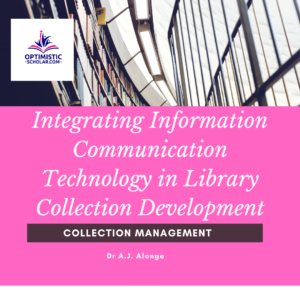You can also SUBSCRIBE to our Newsletter Here
*Meaning and Application of ICT in Collection Development
Defining ICT
Applying ICT to Collection Development
- Community Analysis:** Using ICT tools like iPads, computers with internet access, telephones, and photocopiers can significantly aid in gathering community insights. Online forms can collect data, computers store the information, and iPads record interviews. During community forums, projectors display library resources, enhancing engagement and information sharing.
- Collection Development Policy: The internet provides access to existing collection development policies from various libraries, serving as references for developing new or revised policies.\
- Selection: ICT facilitates the selection process through tools such as computers and telephones. Committee members can submit recommendations online, while extensive online bibliographic databases (e.g., the Library of Congress or OCLC) and publishers’ catalogues offer resources for potential acquisition. Social media platforms and email also enable user participation in the selection process.
- Acquisition: Computers are used to create and print order forms, while online forms streamline submission and tracking. Photocopiers produce additional copies as needed. Telecommunication allows for direct contact with publishers and vendors to ensure timely delivery.
- Weeding and Evaluation: If the library is automated, software helps identify seldom-used resources, triggering evaluation and potential weeding. Online surveys can collect user feedback on library resources and facilities, facilitating effective decision-making.
Through these discussions, it’s evident that ICT is not just a facilitator but a transformative force in modern collection development, driving efficiency and enhancing library services to meet contemporary needs.
Lecturer:
Dr. Ayodele John Alonge, the University of Ibadan, Nigeria
Assignment
Discuss the role of Information Communication Technology (ICT) in the process of collection development within libraries. Your answer should include specific examples of how different ICT tools and technologies are applied.
Answering Guide
Community Analysis (5 marks)
Describe how ICT tools like iPads, computers, and internet connectivity are utilized in gathering and analyzing community information.
- Collection Development Policy(5 marks)
Explain how the internet aids in the formulation and revision of collection development policies by providing access to various templates and examples.
- Selection (5 marks)
Discuss the use of computers, online databases, and social media in the material selection process and how they facilitate greater participation and efficiency.
- Acquisition (4 marks)
Outline the role of ICT in the acquisition phase, focusing on how computers and online systems streamline the ordering and monitoring of library resources.
- Weeding and Evaluation (4 marks)
Illustrate how automated systems and online surveys are employed in the weeding and evaluation of library collections to ensure relevance and user satisfaction.
...For the latest news update, Subscribe to our WhatsApp Group Chat (Click Here)
You can also SUBSCRIBE to our Newsletter Here
Have any questions, send us a mail via info@optimisticscholar.com or Click Here


